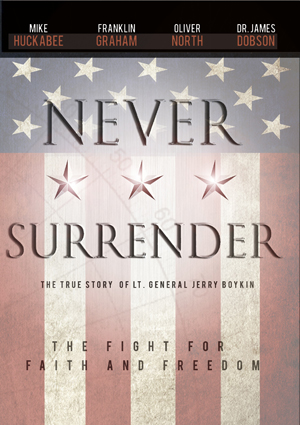OldSpeak
Never Surrender: Dogma and Identity in a Post-Iraq America
By Carrick Owlett
September 14, 2012
 For the past several decades, Lieutenant General Jerry Boykin has worked as part of the American military to promote America’s interests abroad. Never Surrender tells the story of Lt. Gen. Boykin and his time on Delta Squad, a USMC Special Operations team. Beginning with the Iranian hostage crisis in 1979, Boykin describes how his dedication to Christianity and country led him through landmark events in recent history such as the arrest of Panamanian dictator Manuel Noriega and the Battle of the Black Sea, colloquially known as Black Hawk Down. Director and producer Daniel Lusko intersperses Boykin’s story with interviews from former Arkansas Governor Mike Huckabee, former Lt. Col. Oliver North, Reverend Franklin Graham, and other conservative leaders and pundits. Subtitled “The Fight for Faith and Freedom,” Never Surrender also outlines in detail current fears of Islamic fundamentalism and the perceived encroachment of Islamic law in the United States.
For the past several decades, Lieutenant General Jerry Boykin has worked as part of the American military to promote America’s interests abroad. Never Surrender tells the story of Lt. Gen. Boykin and his time on Delta Squad, a USMC Special Operations team. Beginning with the Iranian hostage crisis in 1979, Boykin describes how his dedication to Christianity and country led him through landmark events in recent history such as the arrest of Panamanian dictator Manuel Noriega and the Battle of the Black Sea, colloquially known as Black Hawk Down. Director and producer Daniel Lusko intersperses Boykin’s story with interviews from former Arkansas Governor Mike Huckabee, former Lt. Col. Oliver North, Reverend Franklin Graham, and other conservative leaders and pundits. Subtitled “The Fight for Faith and Freedom,” Never Surrender also outlines in detail current fears of Islamic fundamentalism and the perceived encroachment of Islamic law in the United States.
The first half of Never Surrender, despite the very likable Boykin and his impressive war stories, is fairly superficial. The narrative thread is disjointed, with Lusko relying on brief, loosely associated vignettes of Boykin’s service in place of cogent structure. The centrality of faith fails to properly come through because of this reliance on anecdotal storytelling: Lusko never actually makes an argument as to why Boykin’s faith in particular (which is referred to as “conservative Christianity”) inspires freedom or egalitarianism, a seemingly obvious item to include in a movie that advocates Christianity as a democratic virtue. The result is a mildly inspirational but ultimately saccharine and shallow glance at Boykin’s extensive military service.
The lack of urgency in the first half of the film makes the sudden transition to the second half all the more jarring. Lusko completely leaves Boykin behind to explore his real purpose, exposing what he views as the imminent threat of sharia law. Sharia law, the social and legal code derived from the Quran and other important Islamic texts, is used throughout the Middle East, though only a handful of places (e.g. Saudi Arabia) operate solely based on this legal code.
According to interviews throughout Never Surrender, sharia dictates not only the legal system of Muslim nations, but also mandates the slow, deliberate infiltration of the code into every world nation. Conservative family talk radio host James Dobson and other interviewees assert that its followers have already invaded most Western governments—including the United States—their fundamental objective being the supplanting of the US Constitution. Brigitte Gabriel, founder of the grassroots organization “ACT! for America” is only one of many in the film who discuss the “stealth jihad” currently underway in free societies, and she likens the infiltration in Europe to “stage four cancer”: the United States, she claims, is only at “stage two.”
Though Lusko initially draws the distinction between the small sect of militant Islam and the aggregate religion, it’s clear that for him the only difference lies in the former’s overt acts of aggression. Several interviewees claim that a fundamental tenet of Islam is the spread of sharia law; thus, all Muslims must advocate the overturning of traditional Western legal codes, which would include the constitution. The film argues that Boykin’s “conservative Christianity” and American values are under immediate peril from Islam, aided by the naiveté of progressive organizations and the stigma of political correctness. Lusko’s message is clear: sharia will be a threat to Christianity and democracy for as long as it exists. Oliver North at the end of the film suggests pan-Islamic conversion to Christianity as a way to end this conflict. The irony is evidently lost on the filmmakers.
Never Surrender could have been the compelling story of Lieutenant General Jerry Boykin and his commitment to his values. Instead, Daniel Lusko presents thirty minutes of lackluster biography followed by thirty minutes of thinly veiled and palpably xenophobic propaganda. He offers virtually no objective analysis, and few of the interviewees—all of whom share Boykin’s “conservative Christianity” and politics—could be considered experts on the topic. It chooses to ignore the contributions made by Muslim men and women to the United States and grossly misrepresents ordinary Islam. Misinformation like this can only serve to further the divide that exists between religious groups and stymie religious freedoms in the United States.
DISCLAIMER: THE VIEWS AND OPINIONS EXPRESSED IN OLDSPEAK ARE NOT NECESSARILY THOSE OF THE RUTHERFORD INSTITUTE.


